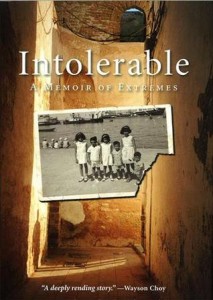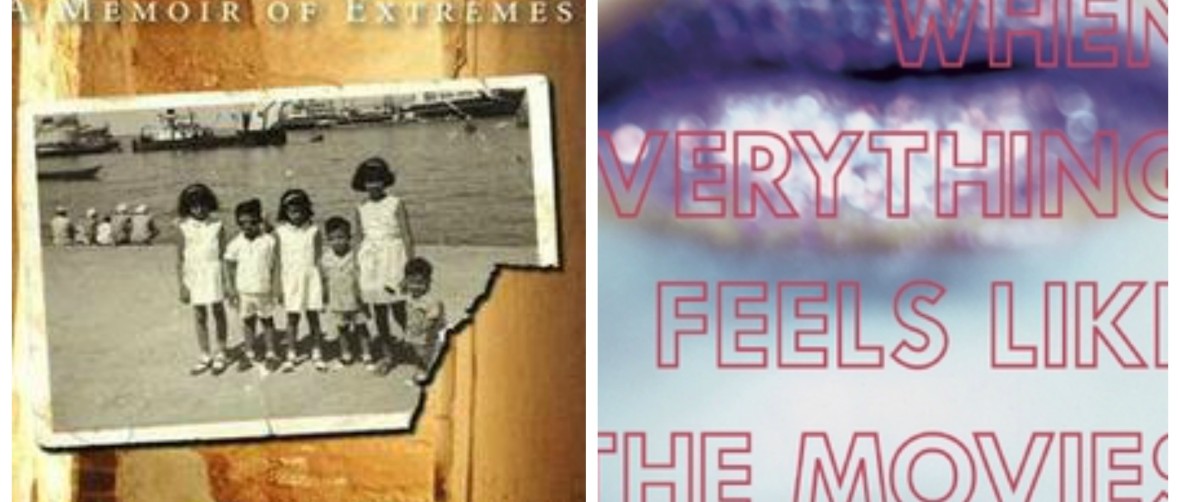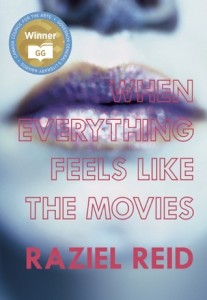 Intolerable: While I do completely agree with Margaret Wente’s comment that Intolerable tells of the journey “toward a new life in Canada, his beloved mother, brothers and sisters succumbed to an increasingly repressive culture that gradually killed their hopes and dreams. Kamal Al-Solaylee has written a powerful memoir that will lift your spirits and break your heart.” Margaret Wente – author of You Can’t Say That in Canada. I am less compelled to say it will remain in the competition to take the Canada Reads 2015 prize.
Intolerable: While I do completely agree with Margaret Wente’s comment that Intolerable tells of the journey “toward a new life in Canada, his beloved mother, brothers and sisters succumbed to an increasingly repressive culture that gradually killed their hopes and dreams. Kamal Al-Solaylee has written a powerful memoir that will lift your spirits and break your heart.” Margaret Wente – author of You Can’t Say That in Canada. I am less compelled to say it will remain in the competition to take the Canada Reads 2015 prize.
Intolerable was my least favourite of the contenders I’ve read to date (only one remaining to read!).
I had written down my many thoughts about Intolerable, but upon finishing and then reading through other reviews on Goodreads , I found Matthew Quann’s review to be perfectly stated and captured many of my same thoughts about this memoir. While I very much appreciated Al-Solaylee’s details of the changing attitudes and restrictions of the Middle Eastern countries he grew up in -this was more of a clear written demonstration of how life in the Middle Eastern countries (Egypt (Cairo), Beirut (Lebanon) and Yemen) changed and moved from a socially and culturally secular society to the prohibitive, restrictive and strict adherence to Islam. The discussion of the building oppression his sisters faced were well detailed- how their lives changed from the days where his many sisters enjoyed social freedoms like wearing mini skirts, bikinis and make up to the silencing of their voices, the requirement to be completely covered and wearing veils. No longer were they able to dine in restaurants alone, everywhere they went a male chaperone was required. “Only ten years before, the same women were splashing in their bikinis in Alexandria.”
Yet, overall, I found it repetitive, the first quarter of the book was spent explaining (and repeating) the large number of siblings in his family, the moves to Cairo, Lebanon and Yemen and back again because of his father’s troubles politically and financially. There were a great number of repetitive mentions of his father dressing in a suit and tie for all occasions, including trips to the beach and overall, generally, a fairly privileged upbringing.
He often wrote more about the growing intolerance towards women, more than anything else, throughout his story. You feel sorry, just as strongly as Kamal does, for his sisters and how drastically their lives changed and how increasingly trapped they became in Yemen. However, he often states as well how he was able to play “the man card”. By using this card, he was successfully able to plot his escape to North America. Sorry sisters – sorry you have to live your trapped lives – but I’m out of here! So here, being a gay man is just an added piece to his story. Although he hated seeing how oppressive the Middle East was becoming, gay or not, he was able to quite easily escape. This was not the case for his sisters, who now required a male to “allow” them to fly anywhere. He notes he has the financial stability to get his family out – yet doesn’t seem to really help them- he says he worries about his family in Yemen, but as Anna (Goodreads) noted in the general discussion page about Intolerable on Goodreads – he leaves you feeling cold. Kamal Al-Solaylee has led a pretty nice life overall — independence, privilege, education. I didn’t feel the fit for Intolerable quite as strongly as the other contenders are for this competition.
This was my least favourite of the five contenders for 2015. It will be interesting to see how this one plays out in the debates, as it is pitting non-fiction against fiction reads. Overall, I did not feel strongly enough about it as a compelling read that “breaks down barriers”, or that it does this over and above the other contenders. 3 stars.
When Everything Feels Like the Movies:
I’ll admit that this book, one of the five finalists for the Canada Reads 2015 competition, was the one I was the least interested in reading. When Everything Feels Like the Movies came with a considerable amount of controversy and much of it came about just after it being named a finalist. I was afraid this book was receiving too much attention and could sway the debates before they were even to start. The genre and description of Everything Feels Like the Movies isn’t one I normally reach for and was therefore quite hesitant about reading. In the end, I am glad I pushed aside my resistance and read with an open mind and also where I kept in mind the purpose of the Canada Reads competition.
Jude (Judy as he is called by the bullies at school) is an openly gay (also flamboyant) teen that tells his story by framing it as though it were a movie or taking place on a movie set.
“They’d scream my name, and I’d let them take a little piece of my soul with each flash. Why not? They were going to take it anyway.” (pg. 23.)
The Set: My middle school was basically a movie set. No one was real. Especially me. We were all just playing our parts. You might be sort of real when you start school but you’re quickly typecast and learn all your lines by rote – mostly because you’ve written them in detention so many times. Everyone fell into one of three categories: 1. The Crew: They made things happen. They took over the honour roll, sports teams, extracurricular activities, and clubs….Without the crew, nothing would ever get done, and we’d all be wandering down the hallways in search of our marks. 2. The Extras: All the misfits, outcasts and social rejects. If you were as chipped as nail polish and didn’t belong, you were an extra – kind of the opposite of the Crew. They were there, but you didn’t really know it; they were just bodies in desks filling space, anonymous smiles in faded school photos, on a boulevard of broken dreams. 3. The Movie Stars: No one thinks they’re more special than they do, but everyone wants to get tagged in a Facebook picture with the stars and get their autographs in the yearbook. They’re selfish, spoiled and overly sexed…and everything that comes out of their mouths is totally fake. I didn’t fit into any category….So there was me, the flamer that lit the set on fire.” (pg. 22.)
Reid uses scorching, shocking and explicit language, sexually explicit words you may necessarily not like to read, but he does nail the teenage/high school voice(s). If you can put aside the aversion to the explicit words, you will realize how deeply authentic Jude’s situation and how heartbreakingly sad life is for him.
Jude may give off an attitude where to all outside appearances may seem as someone very sure of himself, very sure of his sexuality and someone that is not hurt in any way by they way others perceive him, treat him, speak to him. In actuality, we read about a boy that is very sensitive to it all, sensitive and very hurt by his broken down family, and deeply hurt by how others treat him. It is desperately sad but quite brilliant to read how he has framed his life as though it were a movie: his walk to school, his walking down the halls every day is written as though he is arriving for his red carpet walk, his movie premiere and all those fans applauding for him are actually his bullies, there is paparazzi and close ups, etc. There are numerous poignant moments that break through the shock talk, and in the end Reid has applied the real life case where a 14 year old boy approached another boy in school, in front of his peers, to ask him to be his Valentine on Valentine’s Day. In retaliation that boy shot him to death.
(There is one scene in the movie, Pretty in Pink, that kept coming to mind, and it was funny to read towards the end, that Reid also mentions this movie.)
I do see When Everything Feels Like the Movies moving forward in the debates and lasting, definitely longer than Intolerable and probably Ru. This opinion is (thankfully) not grounded due to the controversy that was swirling around Reid’s novel. I am glad to have read it, so that when and if it does last longer during the debates I will know it is due to the message within the story, and it is this message that shines much brighter than Intolerable or Ru. 4 stars.
And wowie – I have now read 4 of the 5 contenders for the CBC Canada Reads 2015 competition! This has never been the case for me. My final read would be Thomas King’s An Inconvenient Indian. I have this on my shelf so was able to wait until it was the last book to read. However, I will also be reading Thomas King’s Green Grass, Running Water for the CBC Goodreads book club. This is for the Reading Across Canada with this month taking place in Alberta. (Monkey Beach by Eden Robinson was the first in this series – reading from British Columbia.)
(A #Canlit strong year for me!)




I have been curious about When Everything Feels Like the Movies since it was first picked as a contender, and before the uproar about it, simply because the title got my attention. I am glad to hear you liked it – now I am looking forward to it even more (that is, if I ever get a copy of it!). I just read another good review of it today on a blog called Cannon Fodder, if you are interested in checking it out.
I share your opinion on Intolerable, by the way, although, to be truthful, I didn’t even have enough interest to finish it. Which makes me feel bad, because I did want to read all 5 books. But, time is short, and there are too many other good ones to read! I hope you enjoy The Inconvenient Indian – that was a good one! And, I think, a strong contender for Canada Reads!
Hi Naomi! I don’t think you have missed much by not finishing Intolerable. I still hold on to my thought that it isn’t the strongest contender for the theme of this year’s Canada Reads. When Everything Feels Like the Movies is worth the read, there are many parts to skim over, but at its heart it is a sad story and does fit well with the theme. I was originally scared that it would be chugging along through the competition only because of the controversy, but I do honestly feel it rightfully should chug along!
(and I need to edit this post – there’s repetition and some fixing up to do! ;-) )